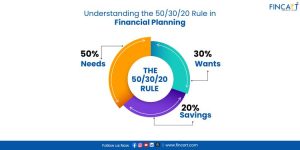Table of Contents
Toggle
In an increasingly complex financial world, the importance of financial planning cannot be overstated. Whether you’re just starting in your career, planning for retirement, or managing a family budget, financial planning is like creating a roadmap for your financial future. It’s not just about managing money; it’s about setting goals, making smart decisions, and preparing for whatever life may throw your way. It involves looking at various aspects of your finances, such as investing, taxes, savings, retirement, estate planning, and insurance. This comprehensive guide will delve into the fundamentals of financial planning, its benefits, and practical steps to get you started on the path to financial stability and success.
What is Financial Planning?
Financial planning is the process of managing your finances through budgeting, saving, investing, and preparing for future expenses. It aims to achieve personal financial goals, ensure financial security, and optimize the use of resources. This involves evaluating current financial status, setting objectives, and implementing strategies to meet them. Engaging in financial planning services can provide expert guidance, personalized strategies, and peace of mind, ensuring your financial health and security are well-managed.Understanding the Different Types of Financial Planning
Different types of financial planning focus on specific areas of an individual’s or an organization’s financial life. Here are some common types of financial planning:1. Investment Planning:
The goal of investment planning is to maximize returns while managing risk by strategically allocating your funds to various assets, such as stocks, bonds, and real estate. A well-informed investment plan considers your financial goals, risk tolerance, and time horizon to create a roadmap for growing wealth over time.2. Tax Planning:
Tax planning involves arranging your financial affairs strategically to minimize your tax liability. To maximize tax benefits and credits, income, investments, and expenditures are analyzed. Tax planning ensures you keep more of your earnings while remaining compliant with tax laws.3. Retirement Planning:
Retirement planning is the process of setting financial goals and strategies to ensure a comfortable and secure retirement. It involves estimating retirement expenses, evaluating potential income sources such as pensions and investments, and creating a savings plan to achieve your desired lifestyle after you stop working.4. Insurance Planning:
To mitigate your risks, you must assess your potential risks and select appropriate insurance policies. Our services cover every aspect of insurance, whether it is life insurance, health insurance, or term insurance. Depending on your circumstances, insurance planning provides financial protection for you and your loved ones.5. Education funding planning:
An education funding plan is a strategic approach to saving and investing in educational expenses. To do this, you need to estimate the cost of education for yourself, your children, or other dependents, and develop a savings strategy to cover tuition, books, and other related expenses. By doing so, you will be financially prepared to pursue academic goals without stress.6. Budgeting:
The process of budgeting involves creating a financial plan outlining your income and expenditures. By tracking where your funds are allocated and controlling your spending, you can manage your money more effectively. Creating a budget ensures financial discipline, enabling you to reach your financial goals.Also Read: What is Budgeting in Financial Management?
Steps in the Financial Planning Process
A financial plan is dynamic and should change as your life circumstances change. You can get financial advice from a financial advisor for a more detailed approach. Stay on track toward achieving your financial goals by regularly reviewing and adjusting your plan. Here’s a detailed step-by-step guide on how to make a comprehensive financial plan:Step 1: Set Clear Goals
As a financial planner, plan your short-term and long-term financial goals, such as buying a house, retiring comfortably, and funding your children’s education.Step 2: Assess Your Current Finances
Take a look at all your financial documents, including bank statements, investment records, debts, and sources of income. Identify your current financial situation by calculating your net worth (assets minus liabilities).Step 3: Determine Your Income and Expenses
Keep a detailed record of your income sources and expenses every month. Identify areas where you can cut costs and allocate more toward your goals by categorizing your expenditures.Step 4: Analyze Risk Tolerance
Determine your comfort level with investment volatility by assessing your risk tolerance. By balancing risk and return, you will be able to make informed investment decisions.Step 5: Build an Emergency Fund
Establish an easy-to-access savings account that holds three to six months’ worth of living expenses. In case of financial emergencies, this fund serves as a safety net.Step 6: Create a Debt Repayment Strategy
Include all your debts, such as credit card balances, loans, and mortgages. Identify your high-interest debts and pay them off first.Step 7: Develop an Investment Strategy
Create an investment portfolio that includes a mix of stocks, bonds, and real estate assets according to your goals and risk tolerance. Managing risk and potential returns is easier with diversification.Step 8: Consider Tax Planning
Reduce your tax liability by investing tax-efficiently. Make the most of tax-advantaged accounts and deductions.Step 9: Review Insurance Coverage
Identify your life, health, disability, and other insurance needs. Protect your financial well-being with adequate protection.Step 10: Regularly Review and Adjust
Keep your financial plan up-to-date by reviewing it periodically. Adjust your budget and investment strategy as your life changes, and stay disciplined.Benefits of Financial Planning
To achieve a secure & prosperous future the need for financial planning is there. In a world of uncertainties, the importance of financial planning offers the need for reassurance of preparedness and a roadmap to your financial aspirations. The need for financial planning portrays not only the need for money; it’s about securing your dreams and ensuring a brighter tomorrow. Proper financial planning ensures continuous growth and expansion over a certain period. Financial planning plays a crucial role in achieving a secure and prosperous future. Let’s check out the benefits of financial planning:1. Clear Financial Goals:
Financial planning provides a roadmap for your financial journey. Setting specific goals with a financial planner helps you work towards tangible objectives and measure your progress.2. Effective Resource Management:
It ensures efficient allocation of your financial resources, helping you make informed decisions about income and expenses. This prevents overspending and promotes saving.3. Improved Financial Awareness:
Financial planning, by a knowledgeable finance advisor, requires a deep understanding of your financial situation. This awareness empowers you to make well-informed choices and stay in control of your money.4. Enhanced Savings and Investments:
Financial planning, guided by a financial consultant, encourages regular savings and structured investments. This disciplined approach helps your wealth grow over time and ensures you’re prepared for future expenses.5. Risk Mitigation:
Through insurance planning and risk assessment, financial planning with a certified financial planner safeguards you against unexpected events like medical emergencies or loss of income.6. Efficient Tax Management:
Effective tax planning helps you minimize your tax liability, preserving more of your earnings for savings and investments.7. Debt Management:
By creating strategies to pay off debts efficiently, financial planner reduces the burden of interest payments and improves your credit score.Looking for a Financial Advisor?
Connect with Fincart for personalized financial advisory services and achieve your financial goals with confidence.
The Role of Financial Advisors
Financial advisors play a vital role in the financial planning process. They provide expertise and guidance to help you create and implement a financial plan tailored to your needs and goals. A financial advisor can assist with investment management, tax planning, retirement planning, estate planning, and risk management. Working with a professional can provide peace of mind and ensure that your financial plan is comprehensive and effective.Conclusion
Financial planning is a critical aspect of achieving financial security and success. By understanding your financial situation, setting goals, and creating a strategic plan, you can make informed decisions that lead to a stable and prosperous future. Whether you choose to manage your finances on your own or seek the help of a financial advisor, taking a proactive approach to financial planning is the key to achieving your financial aspirations.FAQS:
Is Financial Planning a one-time exercise?
No, Financial Planning is an ongoing exercise, it gets revised based on the changing life situations, lifestyles, and life milestones. We do quarterly interactions to review your plan and life situations.When should you begin financial planning?
You should start financial planning after receiving your first earnings. It ensures that you don’t experiment with your hard-earned money and it gets invested in the right way. as it is one of the crucial steps toward a stable financial future.What is the minimum income to start financial planning?
We are not rigid about income, you can start financial planning by picking a single goal or covering your risk to start with. You kick-start your financial planning by putting one phone block at a time. This will make you money confident.Can I make a financial plan on my own?
Yes, you can make your financial plan independently. We have provided you with a simple tool called “Numberless Finance”. This provides you with a basic structure to self-curate your financial plan. However, if you wish to seek help then our trained personnel will be available to help you out.Why should you hire a professional financial planner?
Hiring a professional financial planner acts like a coach tracking your financial progress to ensure that you achieve your life’s financial goals. We spend a lot of time understanding your requirements, then we draw a customized financial plan for you that is best suited for you and your financial goals.What were the 4 components of financial planning?
- Income Management: Evaluating and managing your income sources effectively.
- Expense Management: Tracking and controlling your expenses to align with financial goals.
- Investment Planning: Strategizing investments to grow wealth over time.
- Risk Management: Identifying and mitigating potential financial risks through insurance and other measures.
What are the 5 pillars of financial planning?
- Financial Goal Setting: Defining clear and achievable short-term and long-term financial objectives.
- Budgeting and Expense Management: Creating a budget to monitor and control spending patterns.
- Saving and Investing: Strategically setting aside funds and investing wisely to achieve financial growth.
- Debt Management: Effectively managing and reducing debts to maintain financial stability.
- Risk Management and Insurance: Protecting against unexpected events through insurance and risk mitigation strategies.
What are the benefits of seeking financial advice?
- Expertise: Professionals provide expert insights tailored to your financial situation.
- Goal Clarity: Advisors help define and prioritize financial goals, creating a clear roadmap.
- Optimized Strategies: Customized plans optimize investments, taxes, and overall financial decisions.
- Risk Management: Advisors suggest ways to manage risks and safeguard your financial future.
- Peace of Mind: Knowing you have a well-informed plan brings confidence and reduces stress.
How much does financial advice typically cost?
Our consultation services are Free. However, financial advice depends on company to company.
""




